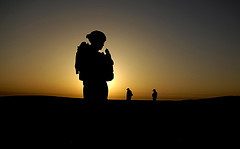Is The U.S. At War With ISIL?

Members of the Obama administration admitted on September 12th that the U.S. is at war with ISIL, according to NBC News. The White House Press Secretary said the U.S. is at war with ISIL “in the same way we are at war with al-Qaeda”.
President Obama further conflated the two groups in his speech on September 10th, noting that ISIL “was formerly al-Qaeda’s affiliate in Iraq” and is “a terrorist organization, pure and simple.” Some argue the implication that ISIL is merely the most recent manifestation of a post-9/11 terrorist threat minimizes the reality of the developing conflict.
While al-Qaeda has attacked regional regimes deemed to be non-Islamic and their allies abroad, ISIL has seized territory in a bid to create a Muslim caliphate. ISIL’s tangible, territorial gains in Iraq and Syria set them apart from traditional terrorist organizations.
"If anything," said Arnaud de Borchgrave, who is the Center for Strategic and International Studies (CSIS) Director and Senior Adviser of Transnational Threats Project, "terrorist organizations like al-Qaeda are conforming more and more to the pattern set by ISIL as they've witnessed its substantial gains."
De Borchgrave, noted similarities between the developing conflict and the war in Vietnam, a war de Borchgrave covered as a journalist for Newsweek. He commented on Gen. Martin Dempsey's announcement on September 16th that we could see American troops accompanying Iraqi forces on the battlefield.
"It's easy," said de Borchgrave, for "military advisors to turn into combat troops. President Kennedy had 12,000 troops stationed in Vietnam as advisors, but after his assassination in 1963 it didn't take long for the advisors to take part in action on the field."
He also questioned the worth of the coalition Secretary of State John Kerry has sought to build.
"They will support us morally, but not physically. If our closest allies won't go in, why should we?" asked de Borchgrave.
The CSIS is an influential Washington think tank, ranked fourth think tank in the world by the University of Pennsylvania's most recent report.
SEE ALSO: Arab League And US to Tackle ISIL
The U.S. first supported the Iraqi state with weapons and funds, then with airstrikes - first in Iraq, then Syria - and now with military advisors. A similar escalation of committement took place in the 1950s and '60s, when America sought to shore up the South Vietnamese government.
"The United States has no institutional memory beyond five years", said de Borchgrave. "Once you stick your hand into something, the rest of the body tends to follow." He questioned the U.S. ability to achieve victory, even with superior airpower. "Airpower does not ensure victory. We had complete air superiority in Vietnam, and we lost that war. In World War II, we dominated the skies after the landings in Normandy, and it still took us months to slog our way to Berlin."
Reach Staff Reporter Timothy Vernon here or follow him on twitter.



